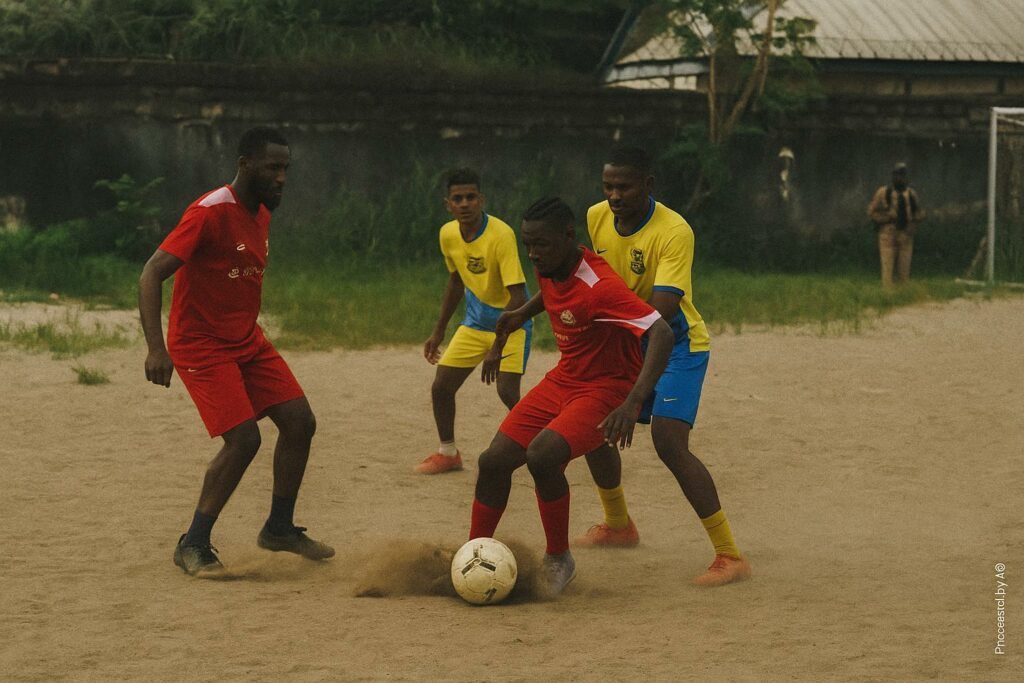A ritual of collective anticipation
On a cloudless July afternoon the dusty turf of the Lycée Technique 5 Février 1979 once again became the epicentre of Brazzaville’s sporting imagination. With the referee’s opening whistle the fifteenth edition of the Ouenzé Lisanga tournament—initiated in 2009 to galvanise local football—kicked off before an audience that blended seasoned professionals, political dignitaries and wide-eyed schoolchildren. To many inhabitants of the fifth arrondissement the event has matured into a rite of seasonal passage, comparable in emotional intensity to the national Cup of Congo yet firmly rooted in the neighbourhood’s own narratives.
Forging unity through sport and symbolism
The tournament’s stated objectives are deceptively simple: offer holiday entertainment, reinforce communal bonds and identify latent talent. In practice each kick of the ball carries a symbolic charge that extends well beyond the pitch. Deputy Juste Désiré Mondélé, who ceremonially launched the current edition, underscored that message by donating equipment to all sixteen participating clubs. His remark that “it is in fact the youth of Ouenzé—and by extension Brazzaville—that will triumph” encapsulates a political philosophy in which social cohesion is not an abstract value but a practical outcome achievable through grassroots sport.
The silent diplomacy of local leadership
Observers of Central African politics are familiar with the notion that soft-power capital is often accumulated far from international summits. In Congo-Brazzaville local tournaments such as Ouenzé Lisanga serve as discreet instruments of what analysts at the Institute for Security Studies describe as “domestic diplomacy”—the art of maintaining civic harmony through visible support to youth initiatives (Institute for Security Studies, 2021). By visibly championing the competition, officials signal attentiveness to the social aspirations of a demographic whose median age hovers below twenty. The gesture resonates with the government’s broader National Development Plan 2022-2026, which earmarks sport as a vector of economic diversification and social inclusion.
Showcasing talent in an informal scouting market
Talent identification remains a central attraction. Across three venues—Ouenzé Lycée, Stade de la Base and the Molokaï ground—coaches from elite clubs discreetly assess emerging forwards and midfield linchpins. In the inaugural clash AS Dépôt and 42 Ans FC delivered a 1-1 draw that illuminated raw technical flair as well as the tactical indiscipline typical of street football graduates. Former national stars such as Ange Ngapi and Franchel Ibara, present in the stands, provided live commentary for local radio, lending aspirants an immediate sense of professional proximity. According to the Congolese Football Federation, over a quarter of current U-20 internationals have passed at some point through comparable arrondissement tournaments (Fédération Congolaise de Football, 2023).
Economic micro-impacts and urban vibrancy
Beyond sporting headlines the tournament injects modest yet tangible liquidity into Ouenzé’s micro-economy. Informal vendors of grilled fish, refresco sachets and mobile-money services cluster around stadium gates, replicating in miniature the value chain envisaged by the Ministry of Small and Medium Enterprises in its 2024 urban livelihoods strategy. Researchers from the University of Marien Ngouabi estimate that a three-week event of this size can circulate up to 45 million CFA francs in petty trade, a not-insignificant sum for households whose monthly incomes average 90 000 CFA (Université Marien Ngouabi, 2022). Thus the tournament aligns with national objectives of poverty reduction through inclusive growth.
Cultural resonance and future horizons
When retired striker Chaleur Mouyabi told reporters that street football had once been his academy, he articulated a collective memory binding generations. His call for replicating the Ouenzé model across the country echoes policy conversations within the Ministry of Sports, which is currently finalising a blueprint for a nationwide network of arrondissement leagues designed to feed provincial centres of excellence. International partners have shown interest: the French Development Agency recently signalled willingness to co-finance youth-sport infrastructure that dovetails with cultural diplomacy programs (Agence Française de Développement, 2023).
The closing ceremony, scheduled under the lights of the Complexe Sportif Alphonse Massamba-Débat, will crown a champion yet the more enduring victory lies in reinforcing the social fabric. By harmonising local initiative with national vision, Ouenzé Lisanga illustrates how a football can trace vectors of confidence and opportunity across Congo-Brazzaville’s urban landscape. It is a small-scale but eloquent demonstration that in the realm of public diplomacy, the most resonant messages occasionally travel on the laces of a well-struck ball.

